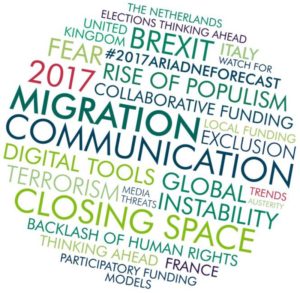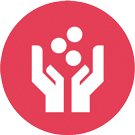
November 2017
Ariadne’s Thread is a monthly update of events, briefings and research for social change and human rights funders.
Ariadne News & Events
 TAKE PART: 2018 ARIADNE FORECAST: Ariadne is creating its fourth Forecast for European Social Change and Human Rights Funders, and we are inviting all Ariadne participants to gaze into their crystal balls and answer six short questions. Your answers will help create the draft forecast report to be presented at roundtable meetings of funders in London, The Hague, Rome and Paris in January and February, where there will be commentaries from senior forecasters. All this input will create the 2018 Ariadne Forecast the aim of which is to help funders and civil society discover new trends, see the big picture and plan ahead. Deadline for filling in the questionnaires is 8th December 2017.
TAKE PART: 2018 ARIADNE FORECAST: Ariadne is creating its fourth Forecast for European Social Change and Human Rights Funders, and we are inviting all Ariadne participants to gaze into their crystal balls and answer six short questions. Your answers will help create the draft forecast report to be presented at roundtable meetings of funders in London, The Hague, Rome and Paris in January and February, where there will be commentaries from senior forecasters. All this input will create the 2018 Ariadne Forecast the aim of which is to help funders and civil society discover new trends, see the big picture and plan ahead. Deadline for filling in the questionnaires is 8th December 2017.
REGISTER NOW: 2018 ARIADNE FORECAST ROUNDTABLE – LONDON: Ariadne will hold its first roundtable in the forecast series on Tuesday 23rd January between 15:00-17:00 GMT at the Foundry in London, United Kingdom. This year we will be joined by Moira Sinclair, Chief Executive at the Paul Hamlyn Foundation and James Logan, Director of the European Office at The Fund for Global Human Rights as our senior forecasters. Hot drinks and nibbles will be provided. To register, please click here. Details about forecast roundtables in other locations will be posted on the Ariadne portal soon.
REGISTER NOW: 2018 ARIADNE POLICY BRIEFING – 7-9TH MARCH 2018: We invite you to register for the 9th Ariadne Policy Briefing between 7-9th March 2018 in Paris for two and a half days of networking, understanding the cutting-edge issues for European funders, improving your grant-skills and having an informative and enjoyable time in the company of fellow funders and grant-makers. The briefing will include a selection of visits to local sites of interest to social change and human rights funders, several breakouts and plenary sessions, networking dinners and opportunities for participants to organise informal open sessions throughout the event. Space is limited so please register early to be sure of a place.
REGISTER NOW: ARIADNE PORTAL TUITION: An hour’s tuition session to improve your skills in using the Ariadne Portal will be held on Thursday 14th December at 15:00 GMT. This is an online webinar you can participate in from your desk. To join, you will need a computer or tablet (iPad/Android) to watch the online demonstration. To register, please RSVP here. For additional dates for portal tuitions, please click here.
 SUBMIT NOW: INVITING SESSION PROPOSALS – ARIADNE POLICY BRIEFING 2018: The planning committee has requested fresh ideas for break-out and plenary sessions for the Ariadne Policy Briefing in Paris. We would be delighted to receive your session proposals. The deadline for submissions is Thursday 23rd November 2017. If you would like to send a proposal, please download the session proposal template here. See here for more details.
SUBMIT NOW: INVITING SESSION PROPOSALS – ARIADNE POLICY BRIEFING 2018: The planning committee has requested fresh ideas for break-out and plenary sessions for the Ariadne Policy Briefing in Paris. We would be delighted to receive your session proposals. The deadline for submissions is Thursday 23rd November 2017. If you would like to send a proposal, please download the session proposal template here. See here for more details.
*To register for Ariadne events, your institution must be a member organisation of Ariadne. For questions regarding your membership status, please contact Lori Klos.
New Research, Articles and Judgements
Freedom of the Net 2017 – Manipulating social media to undermine democracy: In its new report Freedom of the Net for 2017, Freedom House reports that disinformation tactics contributed to a seventh consecutive year of overall decline in internet freedom, as did a rise in disruptions to mobile internet service and increases in physical and technical attacks on human rights defenders and independent media. See also, Utilising social media data for good by The Governance Lab, as well as Can Germany fix Facebook? A new law seeks to protect “human dignity” on the internet, by The Atlantic.
German parents can register babies as third gender, court rules: According to this article by the BBC, Germany’s top court has ruled that there must be the option of registering a gender that is neither male nor female on birth certificates. The constitutional court in Karlsruhe has given the government until the end of 2018 to pass a law specifying a category other than male or female. This would make Germany the first European country to allow parents to designate their intersex offspring as a third gender. See also, Intersex children don’t need fixing, by the Open Society Foundations.
Putting human rights at the centre of the renewable energy sector: In this article for the Business and Human Rights Resource Centre, Eniko Horvath & Christen Dobson argue that, in their efforts to quickly mitigate the negative impacts of climate change, advocates have a critical opportunity and responsibility to put human rights at the centre of the renewable energy sector. See also, the climate change and human rights series by the OpenGlobalRights that examines the role of human rights in climate advocacy and the challenges activists face in this space.
Risky business: Tackling exploitation in the UK labour market: This report by Focus on Labour Exploitation, sets out FLEX’s action plan for a UK response to exploitation in the labour market. It starts by identifying the risk of exploitation to individuals in the UK labour market. It then presents solutions to such exploitation through labour inspection and enforcement; gateways to advice and remedy; and corporate accountability. In so doing the report provides a comprehensive guide to an effective response to human trafficking for labour exploitation in the UK.
How Europe exported its refugee crisis to North Africa: In the high summer, peak time for traffic across the Mediterranean, numbers fell by as much as 70%. Fewer people are crossing the Mediterranean now, but a bottleneck has been created instead, in a part of the world least able to cope with it, North Africa. In this Guardian article, Mark Rice-Oxley and Jennifer Rankin look at the European policymakers’ response to the migrant route into Europe in 2017. See also, Restrictive EU policies are putting refugee children at risk, by Save the Children.
Islamophobia – Still a challenge for us all: This new report from Runnymede brings together varied perspectives from leading thinkers on inequality and Muslims in Britain, unpacking issues such as integration, hate crime, gender, identity and racism.
What is the public mood like in Crimea? In this article for Carnegie Europe, Gwendolyn Sasse analyses a survey from the Centre for East European and International Studies, which provides a rare glimpse into the public mood in the region (the full report is forthcoming). The survey reveals that there has been a comprehensive reorientation of the social and political linkages of the Crimean population. Only 12% of the survey respondents say that they have travelled to other parts of Ukraine since 2014, and 44% state that they have less contact now with family members based elsewhere in the country.
Positive Peace Report 2017 – Institute for Economics and Peace: Previously there has been little understanding of the main drivers of the transition to peace, but the release of the Positive Peace Report 2017 aims to help shine a light on this question. This new report from the Institute for Economics and Peace analyses the factors associated with changes in peacefulness and how they differ across different societies.
Rethinking protection, power, & movements: This new report by JASS, Rethinking Protection, Power, and Movements brings a feminist and social movement perspective to the question of why, despite advances in legal and institutional protections for women human rights defenders, women activists and their organisations are more at risk than ever. See also, Creative persistence: women’s funds responses to the backlash against feminism by OpenGlobalRights.
Poland: Dismantling rights protection: The Polish government has used its majority in parliament to pass laws that weaken checks and balances on the executive, undermine the rule of law and threaten a broad range of human rights, according to a new Human Rights Watch report. Eroding Checks and Balances: Rule of Law and Human Rights Under Attack in Poland, analyses the negative impact on human rights, judicial independence and the rule of law resulting from legal changes introduced by the Law and Justice Party since it came into power in October 2015. See also, Shrinking spaces in Hungary and Poland by Carnegie Europe.
Philanthropy in India report: This report on Indian philanthropy from Philanthropy for Social Justice and Peace is based on a study that started in 2016. It is part of a larger study in other emerging economies to review the current state of philanthropy and what role it is playing in the world. It provides an overview of philanthropy in India, particularly shining a light on new ideas and innovations, and the implications of these for the future role of philanthropy.
Fundamental rights in surveillance: builds trust, improves security: Reforms to surveillance laws are improving transparency but better checks and balances to match the powers of intelligence services are needed, finds a new report from the European Union Agency for Fundamental Rights. It shows how clear legal frameworks, robust safeguards and effective oversight are needed to enhance security and respect fundamental rights.
Blogs and Other Sites of Interest
 Connecting communities through art: Brazilian artist, Rimon, has travelled to places like Gambia and Syria, using street art to connect with communities and help develop educational programmes through the Conexus Project.
Connecting communities through art: Brazilian artist, Rimon, has travelled to places like Gambia and Syria, using street art to connect with communities and help develop educational programmes through the Conexus Project.
PODCAST: Does protest really work? How do ordinary citizens become dissidents? A journalist and human rights advocate, Steve Crawshaw has witnessed extraordinary change, everywhere from Prague to Yangon. In this talk for the London School of Economics, he explores what Vaclav Havel called the “power of the powerless,” and the role of creative mischief in achieving change.
A new diagnostic tool for inclusive city building: Cities of Migration has launched the new tool MyCOM, the My City of Migration Diagnostic. The MyCOM Diagnostic is a new, easy to use tool designed to help you assess the quality of inclusion in your city: at work, at school, on election day, on health and as a new arrival. Build a custom profile of your city’s strengths and weaknesses across 10 dimensions of inclusion. See also Migration and its impact on cities by The World Economic Forum.
George Soros transfers billions to Open Society Foundations: According to The Guardian, the financier George Soros has transferred about $18bn (£13.7bn) to his human rights foundation Open Society Foundations, bringing his lifetime giving to $32bn and making the foundation one of the world’s largest. The donation makes OSF the third largest charitable foundation in the world, behind the Bill and Melinda Gates Foundation and the Wellcome Trust.
Human Rights “Light”: using rhetoric to unite disparate disciplines: In this blog post for OpenGlobalRights, Tony Talbott argues that far from ‘dumbing down’, so-called ‘human rights-light’ language offers a way to open up human rights and to build broader alliances across diverse social movements.
Who sits on the typical trustee board? A new report on trusteeship, published by the Charity Commission, shows that the average trustee is likely to be male, 60 or older years of age and 92 per cent white. In this article, Civil Society looks at the key statistics from this report, called Taken on Trust: The Awareness and Effectiveness of Charity Trustees in England and Wales. The report is taken from a survey sample of 19,064 trustees through a national survey in January 2017. Around 3,500 trustees responded to the survey.
WATCH: Changing the conversation about refugees: In this video, Anat Shenker-Osorio, a communications expert and researcher who applies tools from cognitive science and linguistics in her work with progressive organisations globally, discusses what language we should use when talking about people seeking asylum. Also by Anat, How to create messages that resonate where others flounder.
Mapping of UK faith networks supporting refugees, migrants and asylum seekers: The report Mapping of UK faith networks and their role in service delivery and advocacy for refugees, migrants and asylum seekers, commissioned by the Migration Exchange funder network aims to enable greater understanding of the role of the faith sector in providing direct support to migrants and refugees, of faith-led advocacy for fair migration and protection systems, and of the connections between faith and core refugee and migration sectors. The report includes a typology of faith actors and their strengths and opportunities for their involvement in work with migrants and refugees.
Romania has third-lowest pay gap between women and men in EU: According to Romania Insider, Romania, Italy and Luxembourg recorded the lowest gaps between women’s and men’s wages in 2015. Luxembourg and Italy saw the lowest pay gaps, namely 5.5%, followed by Romania with 5.8%, Belgium with 6.5% and Poland with 7.7%. See also the BBC article, Women won’t have equality for 100 years – World Economic Forum.
WATCH: Unique model of deforestation monitoring: In this video for the Skoll Faoundation, Carlos Souza and Beto Verissimo of Imazon discuss their latest unique model of deforestation monitoring for the tropical rainforest which uses state-of-the-art remote sensing and mapping that enables prosecution for illegal clearing. The aim is to incentivise ranchers and agricultural producers to find alternatives. This data is used to aid the government, scientists, local and indigenous people and industry. See also, Forest defenders could pave way to a low-carbon future, by the Human Rights Watch.
WATCH: Sharing grants data: A grantmaker perspective: Alex Van Vliet, Research and Data Analyst at the Lloyds Bank Foundation shares why publishing their grants data openly will lead to better collaboration. Each year Ariadne, in partnership with the Human Rights Funders Network, collects grants data to create interactive data and research tools to help human rights funders and advocates become more effective. If you would like to know how to submit your 2016 grants data and for more details, please email Lori at lori.stanciu@ariadne-network.eu.
New website showcasing seven success stories about innovative solutions to social and environmental challenges: The European Venture Philanthropy Organisation has launched a new website showcasing seven success stories about innovative solutions to social and environmental challenges, and how, thanks to the venture philanthropy approach, foundations and funds have supported these projects in achieving and scaling their social impact.
Do you have a great blog post, case study or podcast you’d like to contribute? We would love to feature it. Email Lori Stanciu at lori.stanciu@ariadne-network.eu.
 Why disability rights are central to social justice work and what we’re doing about it: Noorain Khan, Programme Officer at Ford Foundation highlights why disability rights are central to social justice work and what the foundation is doing about it in this blog for Equals Change Blog. See also Darren Walker’s presentation during a London School of Economics event, where he discusses the work and focus of the Foundation, and the greater role of philanthropy in reducing inequality.
Why disability rights are central to social justice work and what we’re doing about it: Noorain Khan, Programme Officer at Ford Foundation highlights why disability rights are central to social justice work and what the foundation is doing about it in this blog for Equals Change Blog. See also Darren Walker’s presentation during a London School of Economics event, where he discusses the work and focus of the Foundation, and the greater role of philanthropy in reducing inequality.
Recording: Webinar – The State of Civil Society in Turkey: Challenges and Opportunities: The recording of the Ariadne webinar on the state of civil society in Turkey is now available. Emma Sinclair-Webb, Senior Turkey Researcher, Human Right Watch; Emel Kurma, Co-Executive Director, Citizens’ Assembly and Meerim Ilyas, Senior Programme Officer, Urgent Action Fund update donors on the situation of activists and NGOs in the country, how they are mobilising, what their current needs are, and how donors outside of Turkey may be able to engage and support Turkish civil society under the current circumstances.
Recording: Webinar – Funder webinar on discrimination in algorithmic decision-making: If you were unable to attend this Ariadne funder webinar on discrimination in algorithmic decision-making, but would have liked to, the recording is now available. This webinar with Patrick Ball, Director of Research at the Human Rights Data Analysis Group, and Julia Angwin, investigative journalist at ProPublica looks at the risks of automated judgements in social and political contexts and ideas for what funders can do. Also available are Patrick Ball’s slides, which are licensed as a Creative Commons. Patrick is happy for you to share these slides, but asks that you please attribute them to HRDAG.
Why shrinking civil society space matters in international development and humanitarian action: The European Foundation Centre and the Funders’ Initiative for Civil Society have launched a paper which addresses the trend of closing civil society space, how it is impacting development and humanitarian funders and actors, and sets out potential solutions to deal with the issue. The paper is complemented by blogs by several experts, focusing on their particular responses to the closing space via alliance-building and engagement in country specific contexts and the work around security policy and de-risking.
Global surveys of intersex and trans groups reveal critical funding gaps: The Astraea Lesbian Foundation for Justice, American Jewish World Service and Global Action for Trans Equality have recently launched two new reports, The State of Intersex Organizing (2nd Edition) and The State of Trans Organizing (2nd Edition). Their responses provide the most comprehensive data to date on how trans and intersex groups are organised, their current financial status, their funding needs and priorities, their capacity needs and priorities, and the barriers they face accessing and implementing grants. The research shows that despite facing major human rights violations and engaging in a wide variety of activities to address them, intersex and trans groups remain deeply under-resourced. A social media toolkit is also available.
Financing for social impact – The key role of tailored financing and hybrid finance: This new report by the European Venture Philanthropy Association looks at how funding can be shaped in a way that meets the financial needs of the social purpose organisation (SPO) and at how different actors in the venture philanthropy/social impact space can collaborate to bring more resources to SPOs. Tailored financing and hybrid finance promote a more efficient and effective deployment of resources in the VP/SI space and represent a way to solve the existing funding gap that prevents SPOs from gaining access to the capital needed for achieving self-sustainability and for scaling.
Breaking barriers to participation: Five years of participatory grantmaking at the Red Umbrella Fund: In this blog, Jurre Anema of the Red Umbrella Fund reflects and documents the Fund’s five year experience in order to further improve its work in the future.
Briefing on Syria: The Syria Working Group at Global Dialogue has prepared Syria Briefing, Issue 3, July-September 2017, providing an overview of developments in the country and an edited list of key readings.
Five ways foundations can ensure that evaluations measure true impact: In this article for The Chronicle of Philanthropy, Stephen Isaacs and Paul Jellinek, authors of ‘Foundations 101: How to Start and Run a Great Foundation’, look at five ways foundations can ensure that evaluations measure true impact.
Civil Society under threat: Why protecting and growing civil society globally is vital: Head of Programmes at Barrow Cadbury Trust, Debbie Pippard, blogs about what UK civil society can do to support and nurture a strong and healthy civil society in the UK and overseas. See also, these 50 trends shaping the future of civil society in the UK, from the Futures Centre, showing what the Centre believes will have a significant impact on the lives of people in the UK in the coming decade.
Interview: Massimo Lapucci of Fondazione CRT: Massimo Lapucci, Secretary General of Fondazione CRT in Italy and the European Foundation Centre’s Chair, sat down at the EFC’s annual conference in Poland in June with Alliance Editor Charles Keidan, to talk Italian foundations, venture philanthropy and his vision for the EFC.
To build healthy relationships with grantees, funders need to shift the power dynamics: In this, article for the National Committee for Responsive Philanthropy, Jennifer Choi argues that, to build healthy relationships with grantees, funders need to shift the power dynamics. She encourages national funders to go even further to ensure that their strategies are relevant in the local landscape, by having humility, and being transparent, communicative and clear about their roles in partnership with local players.
How the EU is failing whistleblowers: In this blog for Open Society Foundations, Peter Matjašič looks at whistleblower protections in Spain and across Europe. Whistleblower protections remain fragmented and imperfect. Both national and European institutions lack comprehensive legislation to support whistleblowers, and both show little political will to do anything about it. Even in institutions where the legal protection of whistleblowers does exist, provisions are often vague, do not ensure anonymity, and fail to include all civil servants and their employees.
The next Thread will go out on Thursday 14th December. We would love to hear from you! Please contact Lori Klos by 12th December if you would like to share announcements, events, or resources for the next issue.
Jobs and Tenders
European Coordinator & Brussels Liaison – Ariadne: Ariadne – European Human Rights and Social Change Funders Network is looking for a European Coordinator and Brussels Liaison to coordinate the French-language and Dutch portions of its network, support network development in other parts of Europe, and to represent Ariadne in Brussels. Location: Brussels, Belgium. Deadline for applications is 24th November 2017.
Research Consultant – The Global Philanthropy Project: The Global Philanthropy Project seeks to engage a research consultant (or team) who will work with GPP Staff and a group of grantmaking stakeholders to develop and implement research and documentation on the global impact of the rise of the religious right, and the instrumentalisation of faith and religious institutions towards an anti-LGBTI social and political agenda, affecting global LGBTI communities and individuals. Deadline for applications is 4th December 2017.
Director of Research, Knowledge & Advocacy – Mama Cash: Mama Cash is seeking a Director of Research, Knowledge & Advocacy to lead the development and implementation of the vision and strategic direction for Mama Cash’s thought leadership, knowledge building, and influencing work. A key focus of the position is establishing the organisation’s political voice, positioning, and impact, with a focus on evidence and learning. Location: Amsterdam, The Netherlands. Deadline for applications is 29th November 2017.
Human Rights Programme Officer (Defending Civic Space) – Sigrid Rausing Trust: The Sigrid Rausing Trust is seeking a Human Rights Programme Officer, to focus on Defending Civic Space. The portfolio supports organisations working to defend human rights, including groups campaigning against torture and unlawful detention, promoting freedom of expression, protecting human rights defenders, and helping the victims of human rights violations to obtain justice. The post holder will have responsibility for the Defending Civic Space programme with a budget of £2 million. Location: based in London, United Kingdom. Deadline for applications is 20th November 2017.
Grants Officer (UK) – Fund for Global Human Rights: The Fund for Global Human Rights is seeking to add a third Grants Officer to its team. The Grants Management team is the backbone of support for getting resources to frontline activist organisations, managing all administrative aspects of incoming grant proposals and outgoing grant awards, and providing critical support to their assigned programmes. The successful candidate will report to the Manager of Grantmaking Operations to support the Fund’s India portfolio and thematic initiatives (Children in Armed Conflict, Corporate Accountability, Migrant’s Rights, and Enabling Environment for Human Rights Defenders). Location: London, United Kingdom. Applications will be accepted on a rolling basis.
Head of Operations Business Support: A Head of Operations Business Support is sought by an international organisation that develops and manages the philanthropic giving of charitable entities established by family entrepreneurs. They support partners around the globe to foster human dignity, social justice and sustainability. Working within strategic themes of education, society, faith and care, as well as in the field of economic development and climate change, they aim to contribute to systemic social change by combining their thematic expertise with their grassroots networks all over the world. Location: Amsterdam, The Netherlands. Applications will be accepted on a rolling basis.
Grants Manager – The Tudor Trust: The Tudor Trust is hiring a Grants Manager to assess initial funding proposals, prepare full applications for discussion with trustees and take responsibility for a portfolio of grants. The Trust works alongside applicants and acknowledges that they are the experts at finding solutions to meet the needs of their own communities. The Trust, therefore, seeks someone with a high level of emotional intelligence, good listening skills and the ability to provide useful and appropriate support to smaller voluntary organisations. Location: London, United Kingdom. Deadline for applications is 29th November 2017.
*For more jobs, see the ‘Career Opportunities’ section on the landing page of the Ariadne portal.
Public Meetings
AMSTERDAM, THE NETHERLANDS
December 10th – 16th
International Human Rights Conference:
During the fourth edition of its international conference, ABN AMRO will seek to show how human rights are everybody’s business – and what each and every one of us can do: as an individual, as a client, as a business, as an investor, as a philanthropist and as a bank. Speakers will include: Kate Gilmore, United Nations Deputy High Commissioner for Human Rights; Siddharth Kara, lecturer at the Harvard Kennedy School of Government and expert and activist on modern slavery; and Brian Iselin, founder of Slave Free Trade. The event will take place on 12th December in Amsterdam, The Netherlands.
BRUSSELS, BELGIUM
November 19th – 25th
Quo Vadis Eastern Partnership? A retrospective look into the future: This conference, organised by the Open Society Foundations, will critically assess the achievements of the Eastern Partnership policy, the effectiveness of its existing toolbox, and whether it has brought about real change on the ground. Speakers will also look ahead to the Brussels Eastern Partnership summit and beyond, and offer recommendations for calibrating the European Union’s policy to tackle better the emerging trends and challenges in the region. For more information please email Ellen Mulder at ellen.mulder@opensocietyfoundations.org. The event will take place on 23rd November 2017 in Brussels, Belgium.
BIRMINGHAM, UNITED KINGDOM
November 26th – December 2nd
State of the Sector Roadshow: The State of the Sector programme is organised by NPC and supported by PwC, Barrow Cadbury Trust, Ecclesiastical, Odgers Berndston and Cripplegate Foundation. Participants are invited to discuss what the future holds for charities, and how the sector can adapt to deliver greater impact in a changing world. This event will be chaired by Jill Halford, Assurance Director, PwC and will feature a panel discussion responding to the research, of: Javed Khan, Chief Executive, Barnardo’s; Debbie Pippard, Barrow Cadbury Trust; Sue Bent, Central England Law Centre; and Stephen Hale, Refugee Action. The event will take place on 29th December 2017 in Birmingham, United Kingdom.
BRUSSELS, BELGIUM
December 3rd – 9th
Reality Bites: Experiences of Immigrants and Minorities in the EU: The European Union Agency for Fundamental Rights (FRA) will host the conference ‘Reality bites: Experiences of immigrants and minorities in the EU’. During this event, new findings from FRA’s second European Union Minorities and Discrimination Survey will be revealed. The event will address: how widespread discrimination towards different minority groups across different areas of daily life is; how common racist harassment and violence is; how often discrimination and hate crime is reported; how frequent police stops are; how strongly attached minority groups feel towards the country they live in; their levels of social inclusion and participation; and the impact of discrimination and victimisation is having on their sense of belonging. The event will take place on 6th December 2017 in Brussels, Belgium.
January 7th – 13th
Influencing policy – Bringing new voices to the policy environment: Increasingly, organisations are expending more energy on Member States instead of EU institutions when trying to influence decisions. Participants will hear from Andrew Duff, President of the Spinelli Group, on how this landscape is changing and what this means for funders. They will also discuss how new voices can be brought into the policy conversation. Christal Morehouse, Senior Programme Officer at OSIFE, and Matthew McWilliam of the University of Massachusetts Amherst will present their research on how to meaningfully segment popular opinions in society, as income, education and other traditional factors are no longer relevant, and how this could lead to more inclusive policy-making. The event will take place on 11th January 2018 in Brussels, Belgium. To register, email jfitzsimons@efc.be by 15th December.
GENEVA, SWITZERLAND
December 3rd – 9th
Theorising ISIS: Considered the most dangerous terrorist organisation in the world, the Islamic State of Iraq and Syria (ISIS) has become shrouded in numerous narratives, which often fail to grasp its deeper significance to social science. By tracing the group’s genealogy and documenting its evolution in Iraq and Syria, Mohammad-Mahmoud Ould Mohamedou will argue that ISIS has now mutated into an unprecedented hybrid form that distils postcolonial violence, postmodernity and an emerging post-globalisation international order. The event will take place on 7th December 2017 in Geneva, Switzerland.
November 19th – 25th
Impact Measurement – What’s New? Charitable organisations as well as impact investors are increasingly faced with the challenges of wanting and needing to show the outcome of their actions. In recent years, various methodologies have been established to meet those needs. Charitable organisations focus mainly on the social impact preferably embedded within a whole community or regional context, whereas entrepreneurial activities often aim for a social and optimised financial return. Frequently investors and philanthropists are now looking to establish a balance between the two areas, creating a trade-off between social return on investment and a monetary one. In this session, the panel and audience will look at best practice from different perspectives; consider how measurement and viable evaluation schemes can be implemented in daily project work; and introduce and showcase different reporting methodologies in use at the moment. The event will take place on 21st November 2017 in Geneva, Switzerland.
November 26th – December 2nd
Viktor Orbán and the new Central Europe: The refugee crisis is but a symptom of the transformation of politics in many parts of the world, but particularly in Central Europe, where the advance of ethnicism and of xenophobia, the fragmentation of institutional structures, the outsourcing of constitutional power to semi-private entities, the growing impossibility of judicial review and the ever slimmer part played by parliaments and courts make it near-impossible for citizens to have a modicum of control over political society. All this is accompanied by various degrees of media control and by the growing dependence of private companies on the good will of the ruler. The event will take place on 28th November 2017 in Geneva, Switzerland.
LONDON
December 3rd – 9th
How to support civil society and grassroots organisations in Russia – lessons learned and new challenges in the current political environment: Open Russia, a pro-democracy movement founded by Mikhail Khodorkovsky, and the National Endowment for Democracy are hosting a roundtable discussion in London for donor organisations interested in supporting Russian civil society and grassroots activism. This will be a discussion of the outlook for Russian civil society and the ways in which international foundations can help make a difference. The event will take place on 7th December in London, United Kingdom. To register, please email: n.andrews@openrussia.org.
November 26th – December 2nd
The Bonnart Trust Anniversary Lecture: In celebration of its 15th anniversary, The Bonnart Trust will be hosting an evening lecture and reception. The lecture will be given by Philippe Sands QC on the theme of ‘East West Street: Personal Stories about Genocide and Crimes against Humanity.’ Philippe Sands QC is Professor of Law and Director of the Centre on International Courts and Tribunals in the Faculty of Laws at UCL, and one of the Trust’s academic partners. He is also a writer, commentator and practicing barrister, with extensive experience litigating cases before international tribunals including the International Court of Justice and European Court of Justice. The event will take place on 29th November 2017 in London, United Kingdom. To register, email info@fbbtrust.org.uk.
December 3rd – 9th
The Standstill Generation – Poverty in the Prime of Life: This event will launch Joseph Rowntree Foundation’s state of the nation report, UK Poverty 2017. The research assesses the progress the UK is making in reducing poverty and tackling its underlying drivers. It looks at how a generation are living in poverty in the prime of life, because the routes to building a decent, secure life are increasingly out of reach. The launch will include a panel discussion to explore how British politics responds to the challenges set out in the report. A keynote address will be given by the Rt Hon Robert Halfon MP, Chair of the Education Select Committee. The event will take place on 4th December 2017 in London, United Kingdom. To register, email events@jrf.org.uk.
December 3rd – 9th
Millennials and Women of Wealth – Giving re-invented and the changing demands on professional wealth advisors: Next Gen philanthropists and social investors will achieve a major impact addressing societal problems. While not less charity minded than previous generations, they will have more funds available for investing in solving social issues as a result of wealth transferring. With more money these social entrepreneurs are growing and changing philanthropy and social/impact investment. According to research and to anecdotal evidence they are driven by values, not valuables, impact and measuring return on investment are their primary focus, and venture philanthropy is one of the preferred models. As a result, millennials and women of wealth are expecting more than wealth advice from their professional wealth advisers – they want to discuss approaches to philanthropy and social investment as part of their wealth planning. In addition, professional advisers must deal with the complexity of providing advice to multi generations. The event will take place on 5th December 2017 in London, United Kingdom. Register by 3rd December.
November 19th – December 30th
Goats: In a small town in Syria, soldiers are celebrated as heroes and grieving families are nourished on propaganda. As the coffins pile up, the local party leader decides on a radical compensation scheme: a goat for each son martyred. “Has anyone ever told the truth? Has anyone ever demanded it? Does anyone want it? Does anyone even need it?” Goats is a major new work by Syrian playwright and documentary filmmaker Liwaa Yazji exploring the lies we choose to believe as a society, and the rippling effect when one man questions the ‘truth’. It has been developed as part of the Royal Court’s long term project with writers from Syria and Lebanon. The production will run from 24th November to 30th December 2017 in London, United Kingdom.
November 26th – December 2nd
Protests and Political Opposition in Russia and the Screening of Nemtsov: As Russia approaches its Presidential election in March 2018, a wave of protests and political mobilisation has shone a new light on the state of Russia’s political opposition. Russian opposition activists have experienced a particularly difficult period since the crack down on the last mass protests in 2012 and the introduction of new laws, which have severely limited opportunities for a free expression and association. Yet a new generation of Russians are defying protest bans to express their stand against corruption and the lack of genuine political competition. With the latest opinion polls indicating that Russians are increasingly looking for change in their lives and a new generation of activists forming across many Russian regions, can the 2018 elections open a new window of opportunity for Russia’s democratic opposition? This event will consist of a panel discussion, a screening of documentary film Nemtsov and a discussion with Director Vladimir Kara-Murza. The event will take place on 30th November 2017 in London, United Kingdom.
December 3rd – 9th
Working in Partnership to Tackle Serious Youth Violence and End Gang Exploitation: In 2015-16 there were 6,290 victims of serious youth violence in London, recording a 4% increase on the previous year, and over a 20% increase on the 2012-13 figures. According to a recent report by the APPG on Runaways and Missing Children, children as young as eight or nine are regularly groomed by gangs for criminal exploitation, particularly for drug distribution. Although focusing mostly on young runaways, the report also reveals that children and young people from stable and economically better off families are also in danger of being groomed by urban criminal gangs. This symposium will provide an opportunity for participants to examine ways to support vulnerable children and young people; share best practice on assisting young people exit gang life; and reduce the level of serious youth violence on our streets. The event will take place on 6th December 2017 in London, United Kingdom.
December 3rd – 9th
Policy Briefing with Helen Stephenson: The charity sector has come under increasing scrutiny in recent years, particularly after fundraising and governance scandals. The Charity Commission has a crucial role in ensuring public confidence in charities is robust, and that trustees can play a crucial role in driving the sector to achieving greater impact for the causes and beneficiaries their organisations exist to serve. NPC invites you to join them for an informal session with Helen Stephenson, the new Chief Executive of the Charity Commission, as she outlines her initial reflections from the role and priorities for the Commission going forwards. A former Director of the Office for Civil Society, Helen has also filled senior roles at the Department of Education, Big Lottery Fund and the Shaftesbury Society, and was chair of the National Childbirth Trust and a member of the Advisory Council of the National Council for Voluntary Organisations. The event will take place on 6th December 2017 in London, United Kingdom.
ONLINE
December 10th – 16th
Closing Civil Space in the Digital Age: Civic spaces are closing around the globe. What role has digital data played in restricting civil society, and what are the next steps for ensuring open civic spaces in this digital age? The panel will discuss the digital threats and constraints faced by civil society actors and organisations across global contexts; identify gaps between principles and practices in democratic societies; and share insights, tools, and strategies for fostering open civic spaces. The event will take place online on 14th December 2017. If you can’t make it, you can still register to access the recorded video and podcast.
November 26th – December 2nd
Beyond Bricks and Mortar – Rethinking Refugees and Housing: Participants in this webinar will learn about housing initiatives that are opening doors to refugee housing and local economic development by creating positive social interactions between refugee and host communities at home, at work and in local neighbourhoods. In Bristol, UK, the #rethinkingrefugee campaign, led by Ashley Community Housing, successfully challenged misinformation about refugee tenants and shifted landlord attitudes from bias against refugees as liabilities to recognising them as community assets. Today, the evolving campaign continues to change perceptions of refugees and other vulnerable groups amongst the public, landlords, local authorities and employers. In Berlin, Germany, the internationally recognised Refugees Welcome initiative provides an easy-to use, secure online platform that lets local residents open their homes and share their living spaces with refugees. Not simply about housing, Refugees Welcome promotes inclusion through co-living which accelerates second language learning and helps refugees get settled, make friends, gain social networks and find employment faster and more easily. The event will take place online on 28th November 2017.
STOCKHOLM, SWEDEN
November 19th – 25th
Is there hope for democracy in Turkey? Turkey’s president Recep Tayyip Erdogan faces a new challenge in the form of a newly founded nationalist party. Meral Aksener, the leader of the ‘Good Party’ aspires to top Erdogan in the presidential election in 2019. Many, in Turkey and abroad, believe that she is the only politician that could beat Erdogan. But what are her chances? How firm is Erdogan’s grip, both on state power and on the electorate? And what are the prospects of Turkish democracy if the alternative to the authoritarian Islamic right is a Turkish nationalist right? The event will take place on 21st November 2017 in Stockholm, Sweden.
THE HAGUE, THE NETHERLANDS
November 26th – December 2nd
The history of violence in a grain of sand: When you zoom in with a microscope into the sand of the northern French coast, you’ll find tiny remains of war material from World War II. Using the latest forensic analysis techniques, inch by inch, photographer Donald Weber, writer Larry Frolick and physicist Kevin Robbie examined the sand beaches of the Northern coast of France. They collected forensic evidence of the precise course of the D-day invasion. The result of this was recently published in the book ‘War Sand’. During this event, Donald Weber will present and discuss this work. War Sand is not only a search for microscopic remnants of World War II, but also confronts us with several questions: What do those remains say of our image of history and social memory? How does this evidence and this almost invisible deformation of the landscape relate to the way we tell the European history of violence? And what does this say about history writing and our self-image? The event will take place on 27th November 2017 in The Hague, The Netherlands.
WASHINGTON D.C., UNITED STATES OF AMERICA
December 17th – 23rd
The New Barbarianism: The National Academy of Medicine will host a free afternoon documentary screening and discussion featuring The New Barbarianism, a Center for Strategic and International Studies (CSIS) Global Health Policy Center original feature. Health care and humanitarian workers are increasingly in the crosshairs as hospitals and aid centres have become part of the battlefield in today’s wars. A profound surge of violence in Syria and other conflict zones has around the world has claimed thousands of lives, destroyed regional health systems, triggered mass displacement and state collapse – and exposed an international humanitarian crisis. The event will take place on 18th December 2017 in Washington D.C., United States of America.
November 26th – December 2nd
No Safe Place – A lifetime of violence for conflict-affected women and girls: The Global Women’s Institute (GWI) and the International Rescue Committee (IRC) invite you to the launch of their research on gender-based violence during times of conflict and crisis in South Sudan. With funding from the UK Department for International Development
Ariadne is supported by the American Jewish World Service, Ford Foundation, McArthur Foundation, Oak Foundation, Open Society Foundations, Sigrid Rausing Trust, Charles Stewart Mott Foundation and Zennstrom Philanthropies.
Ariadne is also supported by voluntary contributions from its participants.















